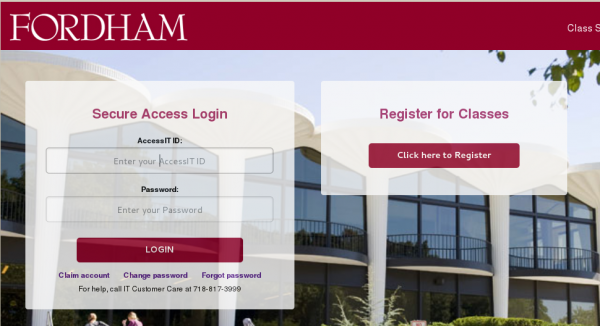Campuses Registration Inequity
November 6, 2014

Fordham University’s registration system may be unable to handle simultaneous multi-campus registration which creates disparities in an attempt to maintain equity. Fordham University Lincoln Center (FCLC) students register before Fordham College Rose Hill (FCRH), but FCLC students have to make concessions because of this.
Robert K. Moniot, Ph.D., associate dean of FCLC, explained why FCLC registers before FCRH students: “Because they’re bigger than us … it is better for the smaller school to register first.”
FCRH is larger than FCLC with 3,649 students enrolled in FCRH and 2,001 in the Gabelli School of Business (GSB). The Lincoln Center campus has 1,765 students enrolled in Fordham College at Lincoln Center and 81 students enrolled in the Gabelli School of Business(GSBLC).
“If you allow students to register [together] the Fordham College Rose Hill seniors would be getting first dibs on courses that might be interesting to Fordham Lincoln Center juniors … both senior classes at both campuses could fill up a class and could lockout lower class FCLC students,” Moniot said
Because of the limitations of the system used for registration, “there is no way we could allow them just to register for FCLC courses and not FCRH courses we have to make them wait for everything until we are all done,” Moniot said.
Moniot maintains that the current system, “does have that effect of protecting FCLC students.”
“The only inequality is that we have to wait and enroll in placeholder courses for insurance to have a full schedule,” Moniot said.
Students enroll in placeholder courses to maintain a full schedule while waiting to see if courses they want at FCRH fill up, but if a course they want to take is open at FCRH, they will drop the placeholder course and will take the course at FCRH.
Since students at FCLC have to wait to register for FCRH courses until FCRH students have registered for courses, many FCLC students are not able to take the courses they want.
Riley Edwards, FCLC ’16, had problems registering for the courses she wanted last year: “When I registered in the spring, a couple of my required courses and another course that I really wanted to take were already full with Rose Hill students because as a Lincoln Center student, I couldn’t register for Rose Hill courses until they’d already had a week or so to register.”
Many students have to have ask their department chairs or class deans for help. “Luckily, the department chair for my major raised the registration cap for my required courses so I could get into them,” Edwards said.
Associate Chair of Communication and Media Studies at FCLC, Gwenyth L. Jackaway, Ph.D. explained, “Students on both campuses are interested in taking classes at the other campus because faculty have different areas of speciality.”
“Departments as big as ours try to offer sections very popular courses on both campuses and inevitabiy there is going to be some disparity in what’s offered,” Jackaway said.
The registration issues only applies to elective and major courses because students must take core classes at their campus, aside from special exemptions that have to be approved by deans.
“The reason that there is a rule that you have to take your core on your home campus has to do with making sure there [are] enough seats available for the appropriate number of students on each campus, ” Jackaway said.
The university does have a different way of handling an analogous situation with FCLC students and students enrolled in Fordham School of Professional and Continuing Studies. “We have a similar although not identical situation here on this campus [Lincoln Center] we have several different schools. We have FCLC and we have PCS ” Jackaway explained.
The way the University handles this registration issue,is they cap the number of FCLC students,” who enroll in a PCS course and “if there are still seats left after the evening students [PCS students] have registered then more day [FCLC] students are allowed. It seems to me that something like that could be worked out between FCLC and FCRH,” Jackaway said.
Moniot maintains that the most equal system for registration is the current system and that “you really have to put up with the placeholder solution.”











